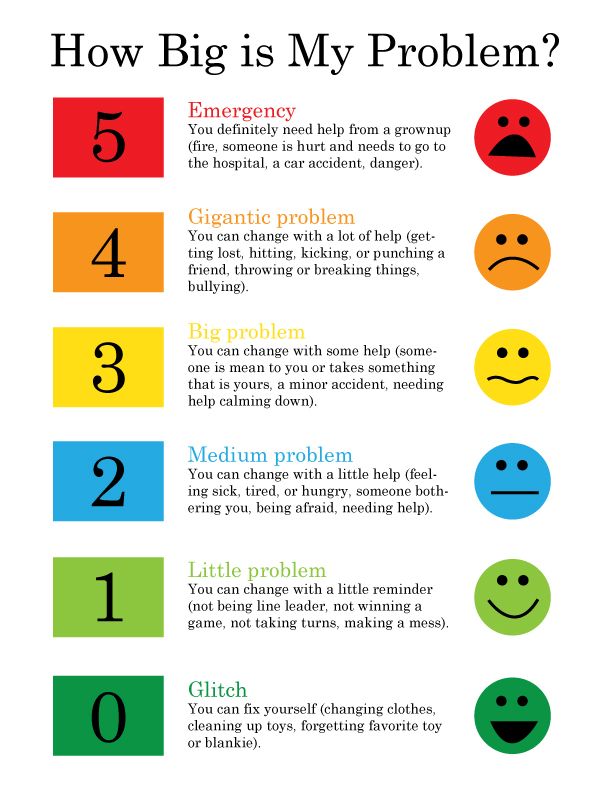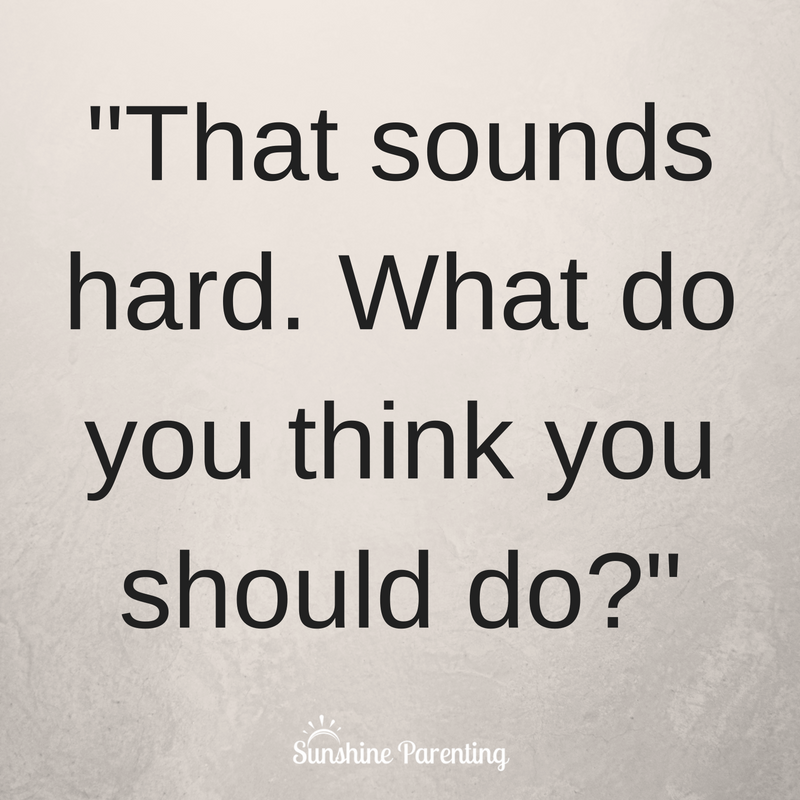How Big is My Problem?
 This past summer at camp, one of our counselors reported a conflict within his cabin group. A camper had told one of his cabin mates to “stop acting so stupid.” The offended camper immediately reported to his counselor that “everyone hated him.” The counselor helped the camper calm down and then facilitated a sincere apology from the child who made the unkind comment. The problem was solved, and the campers went on to have a fun camp session together.
This past summer at camp, one of our counselors reported a conflict within his cabin group. A camper had told one of his cabin mates to “stop acting so stupid.” The offended camper immediately reported to his counselor that “everyone hated him.” The counselor helped the camper calm down and then facilitated a sincere apology from the child who made the unkind comment. The problem was solved, and the campers went on to have a fun camp session together.
Incidents like this one illustrate a trend we’ve seen often at camp in recent summers: Kids seem to be seeking more and more adult intervention and support, even for minor issues like one unkind comment, rather than first trying to solve problems on their own. Problems that counselors are now closely involved with are ones I remember campers mostly solving themselves in the 1980s and 90s.
And it’s not just the children. Parents, too, seem to be asking for intervention more often, with some even having outbursts at our office staff over minor issues.
From my perch as a camp director, it appears that adults AND kids seem to be more anxious, stressed-out, and over-reactive than they used to be.
It also appears that children have become more accustomed to seeking help first rather than trying to address their own problems. Maybe it’s because technology has made it really easy to quickly ask Mom or Dad to intervene. It’s such a simple thing to text Mom, “My teacher lost my assignment,” and have her deal with it rather than taking care of it themselves.
Or maybe it’s all the “anti-bullying” education that encourages kids to label every bad behavior “bullying” and seek immediate adult intervention.
Perhaps it’s because we’re the most loving, involved parents in history, and we feel it’s our job to assist our busy children with every little problem and make them feel better. That’s what Julie Lythcott-Haims proposes in her book How to Raise an Adult. In her list of eight “practical things they’ll need to know how to do before college,” Lythcott-Haims includes:
An eighteen-year-old must be able to handle interpersonal problems. The crutch: We step in to solve misunderstandings and soothe hurt feelings for them; thus, kids don’t know how to cope with and resolve conflicts without intervention.
One important interpersonal skill we’re coaching kids at camp—and I’m teaching my own kids at home—is the ability to discern different levels of problems.
 As parents, we do want our kids to understand the types of serious problems that require immediate adult intervention, things like a friend who’s harming themselves or talking about suicide, dangerous behaviors that could lead to injury or death, and any criminal activity. But we also want them to learn to keep in perspective the normal, interpersonal, day-to-day issues that are just the glitches, inconveniences, and problems of life.
As parents, we do want our kids to understand the types of serious problems that require immediate adult intervention, things like a friend who’s harming themselves or talking about suicide, dangerous behaviors that could lead to injury or death, and any criminal activity. But we also want them to learn to keep in perspective the normal, interpersonal, day-to-day issues that are just the glitches, inconveniences, and problems of life.
Most of the day-to-day issues our children face are somewhat minor ones: a kid who says something unkind, someone cuts in front of them in line, a sub-par grade on a paper. If we react to these things and treat them as gigantic issues, our kids will learn to escalate minor problems, as well.
Let’s take the aforementioned example of a mean comment from a kid. In our own childhoods three decades ago, we might have complained to our friends about the mean comment, laughed about it, or come up with a good retort for the next time the kid said something. Today, a child armed with a phone might text the parent, who might then call the school to report a “bully.” School administrators might respond by going on high alert and scheduling meetings, then a bunch of adults who weren’t even there get themselves in the middle of a typical kid interaction that would have, in the past, helped kids learn how to deal with interpersonal conflicts. In this new modern situation, the reaction from adults to the text reinforces the child “calling in the adult troops” for support the next time an uncomfortable interaction with another child occurs. The minor issues is made into a huge one because of the adult involvement and reaction.
Understanding the difference between a small inconvenience that one can handle without parental support, an emergency-level problem that requires adult intervention, and every level of problem in-between (little, medium, big, gigantic), is an important conflict-resolution and emotion-regulation skill our kids need.
I see many adults who struggle with this, and I believe we’re passing along to our kids the tendency to over-react to all problems, even small ones. Everyone seems to be on “heightened alert” —level 5 emergency—even over something like being cut off in traffic. Our overall anxiety and stress levels seem so high that we sometimes can’t keep things in perspective.
I sometimes see this in our calls from parents at camp. With their children away, parents are naturally on heightened alert and extra concerned, but sometimes that translates into a parent who yells at one of our office staff over not seeing a photo of their child that day. The angry response seems overkill for a minor problem.
Our brains are wired to react to stress or emergencies with our “fight or flight” response. This was extremely helpful for cavemen when predators chased them, but it becomes quite unhelpful when we respond in the same way to being cut off in traffic. Emergency-level responses to things that are not serious cause us—in our stress—to inappropriately react the same way to different degrees of problems. I believe our kids may be learning to apply this one-size-fits-all response as well.
I really like the “How Big is My Problem?” poster, or the idea of using something like it, to teach our kids about different levels of problems, starting at a young age. Our children are going to face problems daily—ranging from mostly minor to major—throughout their lives. Wouldn’t it be great if one of the legacies we gift our kids—through our modeling and guiding an appropriate response—be an appropriate reaction to the problem at hand?
I really want our kids to know how to assess how big their problem is and if it requires adult intervention.
 When kids are young, this can start with conversation. Rather than jumping on the phone or emailing the teacher immediately when our child reports a problem to us, I propose we first sit down and talk through problem-solving with them. By asking them questions, and not showing a dramatic reaction (which we might be feeling on the inside), we can ask questions to get them thinking of how they might solve this problem. Perhaps they may ask us to contact their teacher, but rather than jumping on the phone first—which they’ll interpret as you not believing they are capable of solving this problem on their own—we can give them a vote of confidence in their own ability to resolve the issue.
When kids are young, this can start with conversation. Rather than jumping on the phone or emailing the teacher immediately when our child reports a problem to us, I propose we first sit down and talk through problem-solving with them. By asking them questions, and not showing a dramatic reaction (which we might be feeling on the inside), we can ask questions to get them thinking of how they might solve this problem. Perhaps they may ask us to contact their teacher, but rather than jumping on the phone first—which they’ll interpret as you not believing they are capable of solving this problem on their own—we can give them a vote of confidence in their own ability to resolve the issue.
A good standard response could be, “That sounds hard. What do you think you should do?”
When we guide kids to understand how big their problem really is, and we help them develop confidence in their own problem-solving abilities, we raise competent adults.
